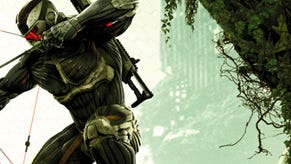Interview: Crysis 2 author Richard Morgan (part 1)
If Crytek and science fiction author Richard Morgan achieve their goals, Crysis 2 will be a "new day" in first-person story-telling, bringing narrative arcs to cities and technology while shunning the now-accepted device of virtual actors speaking lines.
Crytek boss Cevat Yerli has pinned story as one of his sequel's major boost-points, bringing Morgan in to both write the plot and architect a way forward in environment-led narrative delivery. Games like Uncharted 2, apparently, don't do "justice" to the concept of story in games. Crysis 2 will. Small beans.
We spoke to Richard twice after Crysis 2's formal reveal in New York earlier this month, once just after the showing itself and once the following day. Here's the first bit. Warning: this guy can talk.
[Interview by Patrick Garratt.]
Is this going to be the best story in a videogame ever?
Richard Morgan: Oh, definitely. Yep. Absolutely [laughs].
Do you think that stories in videogames have reached a bit of an impasse, in that they need to go somewhere or not, as it were?
Richard Morgan: I think that the industry is moving so fast in terms of the tech that we’re constantly playing catch up. Four or five years ago, you get John Carmack saying, “Story in a videogame is like story in porn. Everyone expects it to be there but it doesn’t really matter.” And now Activision and id have hired Graeme Joyce to write the story for DOOM 4. Graeme Joyce is a novelist, and he’s not just a novelist; he’s a novelist that writes an extremely rarefied kind of dark fantasy, where the fantasy element is an almost homoeopathic dosage. It’s almost just straight fiction. But they hired him.
That whole idea that story is a very secondary issue that we don’t really worry about is gone. Suddenly you’re going, “You know what? This is starting to be a major issue.” It’s starting to be the thing that will hook people. It’s starting to matter. People are starting to say, “This is such a s**t story.”
A number of games that I’ve played in the last year come out and very often you’re playing it and you’re going, “You know what? The gameplay dynamics are great and I’m about to stop this and go and make a sandwich because I’ve forgotten why I’m doing this. I don’t actually care why I’m doing this.” It becomes a compulsion loop minus any sort of emotional investment. Unless you’re autistic, that’s not really adult entertainment, or at least it’s not what I understand as adult entertainment.
I think we’re at the dawn of something really cool. We’re at the stage where studios and developers that really take the game medium seriously are starting to say, “You know what? We really need to pay some attention to this. We need some guys who live story, and that’s what they do.” That’s guys like me. But also, increasingly, I think the guys who write videogames themselves, the actual staff writers, these guys are increasingly starting to see the potential as well.
I’m pretty sure that the writers of a couple of games this year - and I really don’t want to name them, but you’ll probably know which ones they are; in both cases they had an initial instalment that was incredibly well-received and the sequel came out and just... And what you see is that at some point, whoever was in charge of story, whether that was one guy or a bunch of people, said, “You know what? It’s only a videogame.” And at that point the fiction went bang.
In one case it’s totally ruined a game for me, really made me think, “This is just so poor. Guys you really, really, needed to do better than this.” And in the other game it didn’t exactly ruin it for me, but again, I had that thing that I would get to a point where I’d think, “I think I’m going to stop now because I don’t actually care.”
But the times they are a-changing, and there is an understanding of what story can do.
That’s the other thing. I think that for a long time there’s been this sense that story is something that’s kind of running on a parallel track with the game. And we need it, but it doesn’t really have anything to do with the gameplay.
I think for a long time there’s been this raging debate about whether or not games need story at all, about whether or not they should just be pure gameplay.
Richard Morgan: I think you can have that, but I think that that’s not gaming; that’s multiplayer. And multiplayer is a perfectly valid form of gaming, but it’s not the whole story. For me, I’m not online and I don’t tend to do multiplayer gaming. For me, the thing that will sell me a game, and I don’t think I’m hugely unusual in this, is that I’m going to get an 8-10 hour compelling narrative, a story I will want to resolve, that I want to see where it goes.
Again, case in point, I will talk about these guys because I like them: the Uncharted games. Absolutely brilliant. You so badly want to go to the next place; you so badly want to find out what’s at the bottom of these stairs. I don’t believe there was ever a meeting at Naughty Dog where someone said, “You know what? It’s only a videogame.” There was not. It was reversed. It was, “You know what? We’re going to tell the best story that we’ve ever seen in an RPG.” Whereas the other games I was talking about, I’m absolutely sure there was that break point, where the guy goes, “Ah, you know what, it’s only a videogame. It’s a bunch of 15 year-old kids shooting s**t. Who’s going to care?”
And I think people do care, and you’re starting to see that. There’s a backlash developing against one of these games at the moment, and it’s reaching the point where people are suddenly going, “You know what? This isn’t actually very good.”
So, yeah. It’s a new day.
Are you more excited by games or books at the moment?
Richard Morgan: Different kinds of excitement, I think. I love novel-length fiction, and I’ll never want to stop writing novels, but with the best will in the world you have to accept that there’s no way a prose novel can deliver the level of visceral impact that, say, a good comic book or a good game or a good movie can.
At the same time, one of the things that novels do very well in a way that is almost exclusive of the other forms is carry an enormous amount of conceptual weight. I think we’re getting to the point where games are starting to be able to carry heavy conceptual weight; it’s just a shame that more of them aren’t doing it.
They’re different things. It’s like, “Which do you prefer? Apples or oranges?” I dunno. They’re both good. I get different things out of them. What I get from replaying, say, F.E.A.R. or Uncharted 2, is not the same thing that I get out of re-reading a novel by Thomas Pynchon or a science fiction novel by Ray Bradbury. You’re looking for a different kind of entertainment and I think that’s important to understand, but I think what’s also important is this idea that there are values in literature and those values don’t have to only exist in a book. They can exist in all sorts of other forms, and games are especially the case.
I don’t think movies are ever going to get much longer than about three hours, or at least not movies that people want to watch. If you get a good director, a good writer-director like Michael Mann, say, or Cameron, then those guys can extend. They can give you two hours 40 minutes and you’ll stick with it. Ali is almost three hours long, I think, and it’s a very compelling movie. But generally speaking it’s two hours and you’re out, and you start to notice when that two hours is up and the movie’s running longer than that, unless, as I say, you have a really good hand on the helm, you actually start to think, “This is overdue.” I think Dark Knight was very much like that. It got to the point where it was like, “I’ve really enjoyed this, but I’m at the point where I’m thinking that we’re done.” And we still had an hour to go.
With games and gaming narrative: 8-10 hours. And I like long campaigns, so generous guys will deliver 10-12 hours of play. With the open-world, of course, it can get incredibly long. I’m not a big open-world fan, to be honest. Given 10 hours of narrative, you can do a hell of a lot. There’s a lot of space. BioShock is a good case in point. They used the narrative space to do some really cool exploring, and a lot of that was done with ambient story-telling, a lot of it was done with just hints. The level of exploration went on in BioShock was novelistic, I felt. It really did carry the same kind of weight as a novel.
Another game: the Suffering, a Midway game from 2004. Again, very novelistic. It carried the weight of a good horror novel. Carried the weight of a book like Stephen King’s The Shining, or something like that. That’s how it felt. And increasingly that’s becoming the case, that it’s becoming possible to do this stuff. I think with first-person shooters it’s less easy to do. The RPG thing lends itself more easily to it. You can still do it in FPS, you can still come up with compelling narrative and a whole bunch of interesting stuff, and hopefully get the player thinking as well as shooting.
Do you think you’ll be carrying on with game work after this?
Richard Morgan: Oh yeah. Talking to Cevat now about this. Talking to the EA guys as well. Potentially there are a lot of other projects available for me to look at, so that when we finally do lock Crysis 2 down there’ll be a bunch of other stuff to do. I think there’s a huge amount of cool work to be done here.
Some of the guys I’ve worked with have said is that you’ve got to compare this to working in Hollywood in about 1917. The templates are soft; no one’s decided there’s a one-size-fits-all on how to do this. This is a really exciting time to be in any industry, when it’s not formed. I’m going to ride this wave for as long as it’ll hold me up, because there’s a real potential to do cool stuff. With my novels, I try to do something fresh, something different with each one. I hate the Big Mac aesthetic of pop culture, which is, you know, sequelitis: “We’re going to give people exactly what we gave them last time, because they liked it, so let’s do exactly the same.”
All the really cool sequels don’t do that. The reason Aliens is a kick-ass movie is because it actually isn’t like Alien. And similarly, the reason I hope Crysis 2 will be a really kick-ass game, at least in part, is that it’s not like Crysis 1. You heard us all talking about it in there; it’s taking the Crysis 1 template, and it’s going, “Let’s f**k with this. Let’s come up with a bunch of new stuff.” And certainly from my point of view, fiction is an angle to that. And that’s, for me, the main thing. If we can beat that Big Mac mentality and keep delivering fresh stuff, and something fresh gives the consumer something really fresh to do, then I’m happy, because when I’m doing fresh stuff that’s when I’m most awake. With the Crytek experience so far, I’m very awake.
Crysis 2 ships for PC, 360 and PS3 later this year.









